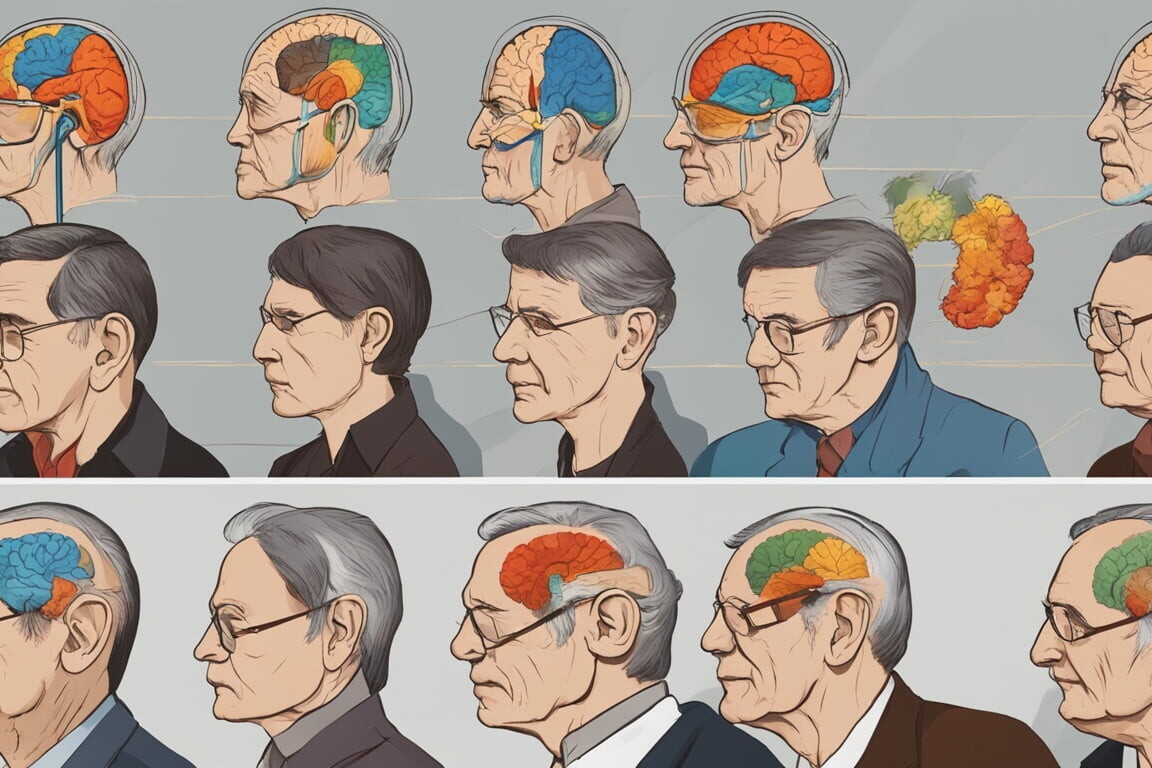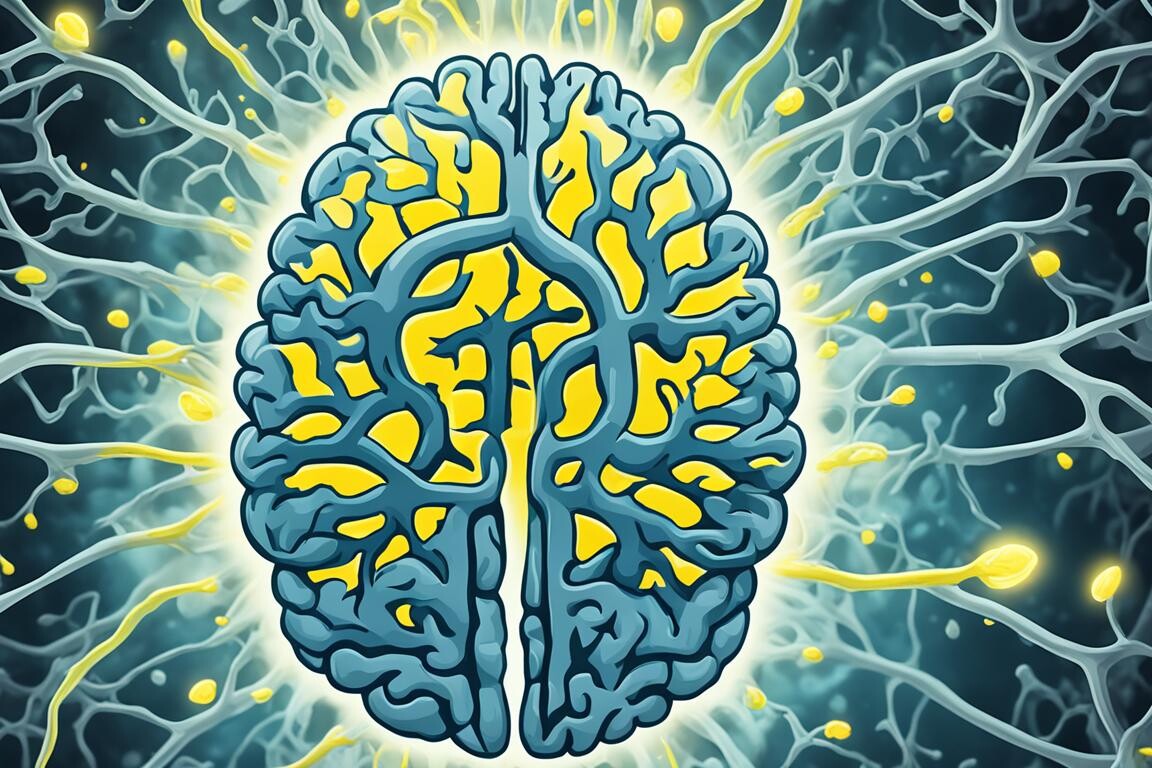Welcome to our article where we will explore the causes of dementia and the underlying factors that contribute to its development. Dementia is a complex condition that affects memory and cognitive health, and understanding its causes is essential for prevention and management.
In this article, we will delve into how genetics, lifestyle choices, and environmental influences can impact the development of dementia. We will also discuss the various neurological conditions associated with dementia and the role of vascular factors in cognitive decline.
By exploring these different aspects, we can gain a comprehensive understanding of the factors that contribute to the development of dementia. Armed with this knowledge, we can take proactive steps to promote brain health and potentially reduce the risk of cognitive decline.
Table of Contents
ToggleGenetics and Dementia
Genetics plays a significant role in the development of dementia. Certain genetic factors, hereditary patterns, and familial histories can increase the risk of developing this condition.
Specific genes have been identified that are associated with an increased susceptibility to dementia. One example is the Apolipoprotein E (APOE) gene, with certain variants of this gene being linked to a higher risk of developing Alzheimer’s disease, the most common form of dementia.
Familial dementia, also known as hereditary dementia, refers to cases where multiple family members are affected by the condition. This suggests a genetic component, as the condition runs in families. For instance, Familial Alzheimer’s disease (FAD) is an inherited form of the disease caused by mutations in certain genes.
Studying the genetic factors that contribute to dementia is crucial for understanding its underlying causes and developing targeted treatments. By identifying individuals with a higher genetic predisposition to dementia, healthcare professionals can monitor them more closely and provide earlier interventions, potentially delaying the onset or progression of the disease.
Common Genetic Factors Associated with Dementia
| Gene | Associated Dementia Type |
|---|---|
| APOE | Alzheimer’s disease |
| PSEN1, PSEN2, APP | Familial Alzheimer’s disease (FAD) |
| MAPT | Frontotemporal dementia |
| PRNP | Prion diseases |
| GRN | Frontotemporal dementia |
Genetics is just one piece of the puzzle when it comes to understanding the causes of dementia. Other factors, such as lifestyle choices and environmental influences, also play significant roles in the development of the condition. In the next sections, we will explore the impact of lifestyle and environmental factors on dementia risk.

Lifestyle and Dementia
When it comes to dementia, our lifestyle choices play a significant role in determining our risk of developing this condition. Making proactive and healthy choices can help reduce the likelihood of cognitive decline later in life.
Diet
The food we eat has a direct impact on our brain health. A diet rich in fruits, vegetables, whole grains, and lean proteins can provide essential nutrients that support cognitive function. On the other hand, diets high in saturated fats, sugary foods, and processed foods can increase the risk of dementia.1
Exercise
Regular physical activity is not only beneficial for our physical well-being but also for our brain health. Engaging in activities like walking, jogging, or swimming can improve blood flow to the brain and stimulate the growth of new brain cells, reducing the risk of cognitive decline.2
Sleep
Adequate sleep is crucial for our overall cognitive function. Chronic sleep deprivation has been linked to an increased risk of dementia. It is recommended to aim for 7-9 hours of sleep each night to support brain health.3
Cognitive Stimulation
Keeping our brains active and engaged can help protect against dementia. Activities such as reading, puzzles, learning a musical instrument, or engaging in intellectually stimulating conversations can help build cognitive reserve and reduce the risk of cognitive decline.4
Social Engagement
Having strong social connections can contribute to better brain health. Regularly interacting with friends, family, and participating in social activities can help reduce the risk of cognitive decline and promote overall well-being.5
By making positive lifestyle choices, such as following a healthy diet, staying physically active, getting enough sleep, engaging in intellectually stimulating activities, and maintaining social connections, we can lower our risk of developing dementia. Taking proactive steps now can have a significant impact on our cognitive health in the future.

Environmental Influences on Dementia
When it comes to understanding the causes of dementia, it is important to consider the impact of environmental factors on brain health. The environment we live in can play a significant role in the development of cognitive decline, including dementia.
Pollution is one of the key environmental factors that has been linked to an increased risk of dementia. Toxins present in air and water, such as heavy metals and pesticides, can enter our bodies through inhalation or ingestion, and may have detrimental effects on the brain. Prolonged exposure to these toxins can contribute to cognitive decline over time.
A growing body of research suggests that long-term exposure to pollution may have a cumulative impact on brain health. Studies have found associations between high levels of air pollution and an increased risk of cognitive impairment and dementia. For example, fine particulate matter (PM2.5), a form of air pollution emitted by vehicles and industrial sources, has been linked to higher dementia rates.
The effects of pollution on brain health can be particularly concerning in urban environments where environmental factors contribute to poor air quality. Individuals living in highly polluted areas may face a higher risk of developing dementia compared to those in cleaner environments.

Reducing exposure to environmental toxins and harmful pollution is crucial in protecting brain health and potentially preventing dementia. Advocating for cleaner air and water, supporting sustainable practices, and minimizing exposure to toxic substances are effective steps towards creating a healthier environment for all.
| Environmental Factors | Toxins | Pollution | Brain Health |
|---|---|---|---|
| Inhalation or ingestion of harmful substances | Impact on brain health | Higher dementia rates | Cognitive decline over time |
| Long-term exposure to pollution | Reducing exposure to toxins | Advocating for cleaner air and water | Minimizing exposure to toxic substances |
By prioritizing environmental health and taking steps to mitigate the impact of environmental factors on brain health, we can work towards a future with reduced rates of dementia and improved cognitive well-being.
Neurological Conditions Associated with Dementia
In this section, we will explore the link between neurological conditions and the development of dementia. Neurodegenerative diseases, such as Alzheimer’s disease and Parkinson’s disease, are commonly associated with cognitive decline. Understanding the relationship between these conditions can provide valuable insights into the underlying mechanisms of dementia.
1. Alzheimer’s Disease
Alzheimer’s disease is the most prevalent form of dementia, accounting for approximately 60-80% of cases. It is characterized by the accumulation of abnormal protein plaques and tangled fibers in the brain, leading to the gradual destruction of brain cells.
The symptoms of Alzheimer’s disease typically include memory loss, confusion, difficulty with language and problem-solving, and changes in personality and behavior. The exact cause of Alzheimer’s disease is still under investigation, but it is believed to involve a combination of genetic, environmental, and lifestyle factors.
2. Parkinson’s Disease
Parkinson’s disease is a neurodegenerative disorder that primarily affects movement. It is caused by the loss of dopamine-producing cells in the brain, leading to the characteristic motor symptoms such as tremors, stiffness, and impaired balance.
While Parkinson’s disease is primarily associated with motor symptoms, cognitive impairment is also common. Approximately 50-80% of individuals with Parkinson’s disease develop dementia, known as Parkinson’s disease dementia. The underlying mechanisms of Parkinson’s disease dementia are complex and involve multiple factors, including the accumulation of abnormal protein deposits in the brain.
| Neurological Condition | Key Characteristics | Associated Dementia |
|---|---|---|
| Alzheimer’s Disease | Memory loss, confusion, changes in behavior | Alzheimer’s disease dementia |
| Parkinson’s Disease | Tremors, stiffness, impaired balance | Parkinson’s disease dementia |
| Other neurodegenerative disorders | Varied symptoms depending on the specific condition | Associated dementia specific to the disorder |
It’s important to note that there are other neurodegenerative disorders that can also be associated with dementia. These include Huntington’s disease, frontotemporal dementia, and Lewy body dementia, among others. Each condition has its own unique characteristics and patterns of cognitive decline.
By understanding the neurological conditions associated with dementia, researchers and healthcare professionals can develop targeted treatments and interventions to improve the quality of life for individuals affected by these conditions.
Vascular Factors and Dementia
When it comes to understanding the development of dementia, vascular factors play a crucial role. Vascular dementia, commonly associated with stroke and cardiovascular health issues, is a type of dementia that occurs due to reduced blood flow to the brain.
Stroke is a major vascular event that can have long-term consequences on cognitive function. It can cause damage to brain cells by disrupting the supply of oxygen and nutrients. As a result, individuals who have had a stroke are at an increased risk of developing vascular dementia.
Cardiovascular health is closely linked to brain health. Conditions such as high blood pressure, high cholesterol, and heart disease can contribute to the development of cognitive decline. When blood vessels become narrowed or blocked due to these conditions, the brain may not receive sufficient blood flow, resulting in cognitive impairments.
It is important to prioritize cardiovascular health to reduce the risk of vascular dementia. Adopting a healthy lifestyle that includes regular exercise, a balanced diet, avoiding tobacco and excessive alcohol consumption, and managing conditions like hypertension and diabetes can help maintain good cardiovascular health and potentially lower the risk of cognitive decline.
| Risk Factors for Vascular Dementia | Prevention Strategies |
|---|---|
| Stroke | Manage risk factors for stroke, such as controlling blood pressure and cholesterol levels |
| Cardiovascular conditions | Adopt a heart-healthy lifestyle, including regular exercise and a balanced diet |
| High blood pressure | Maintain healthy blood pressure levels through lifestyle modifications and medication, if necessary |
By actively addressing vascular factors and taking steps to improve cardiovascular health, it is possible to reduce the risk of developing vascular dementia. It is always better to prioritize preventive measures to safeguard cognitive function and overall well-being.
Other Potential Causes and Risk Factors
While genetics, lifestyle choices, and environmental factors play significant roles in the development of dementia, other potential causes and risk factors should also be considered. Factors such as head injuries, infections, age, and gender can contribute to cognitive decline and increase the risk of developing dementia.
Head Injuries
Head injuries, especially those resulting in traumatic brain injury (TBI), have been identified as potential risk factors for dementia. Studies have shown that individuals who have experienced severe head injuries are at a higher risk of developing cognitive impairments and neurodegenerative diseases later in life. The impact of head injuries on brain health can disrupt normal cognitive function and contribute to the development of dementia.
Infections
Infections, particularly those that affect the central nervous system, can also have an impact on cognitive health. Certain viral, bacterial, and fungal infections have been linked to an increased risk of dementia. Infections can cause inflammation and damage to brain tissue, leading to cognitive decline. It is essential to manage and treat infections promptly to mitigate the potential risks to brain health.
Age and Gender
Age is a significant risk factor for dementia, with the prevalence of the condition increasing with advancing age. As individuals grow older, the brain undergoes natural aging processes, and the risk of cognitive decline and dementia rises. Additionally, gender can also play a role, with women being more likely to develop dementia than men. Factors such as hormonal changes and differences in brain structure and function between genders contribute to this disparity.
Understanding these potential causes and risk factors is crucial in raising awareness about dementia and developing preventive strategies. By addressing head injuries, managing infections effectively, and considering age and gender-related factors, we can work towards minimizing the risk of cognitive decline and promoting brain health.
Conclusion
In conclusion, dementia is a complex condition that can be influenced by various factors. Both genetic and environmental factors, as well as lifestyle choices, can contribute to the development of cognitive decline. Understanding these underlying causes can help us take proactive steps to promote brain health and potentially reduce the risk of dementia.
FAQ
What are the common causes of dementia?
Dementia can be caused by a variety of factors including genetics, lifestyle choices, environmental influences, and neurological conditions.
How does genetics play a role in dementia?
Genetics can contribute to the development of dementia. Certain genes, hereditary factors, and familial patterns may increase the risk of developing the condition.
What lifestyle choices can influence the risk of dementia?
Lifestyle choices such as diet, exercise, sleep, cognitive stimulation, and social engagement can impact cognitive health and the risk of developing dementia.
What are some environmental influences that can contribute to dementia?
Environmental factors such as pollution, toxins, and other exposures can potentially impact brain health and contribute to the development of cognitive decline.
Which neurological conditions are commonly associated with dementia?
Neurological conditions like Alzheimer’s disease, Parkinson’s disease, and other neurodegenerative disorders are frequently linked to the development of dementia.
How do vascular factors contribute to the development of dementia?
Vascular factors, including conditions like stroke and cardiovascular health issues, can play a role in the development of vascular dementia and cognitive decline.
Are there any other causes or risk factors for dementia?
Yes, head injuries, infections, age, and gender can also be potential causes or risk factors for dementia.
What steps can be taken to promote brain health and potentially reduce the risk of dementia?
Understanding the underlying causes of dementia can help individuals take proactive steps, such as maintaining a healthy lifestyle, engaging in cognitive activities, and seeking medical advice when necessary, to promote brain health and potentially reduce the risk of dementia.
About The Author

Medically reviewed by Dr. Chandril Chugh, MD, DM (Neurology)
Board-Certified Neurologist
Dr. Chandril Chugh is a U.S.-trained, board-certified neurologist with expertise in diagnosing and managing neurological disorders, including migraines, epilepsy, Parkinson’s disease, and movement disorders. His clinical focus includes evidence-based neurological care and patient education.
All content is reviewed for medical accuracy and aligned with current neurological guidelines.




